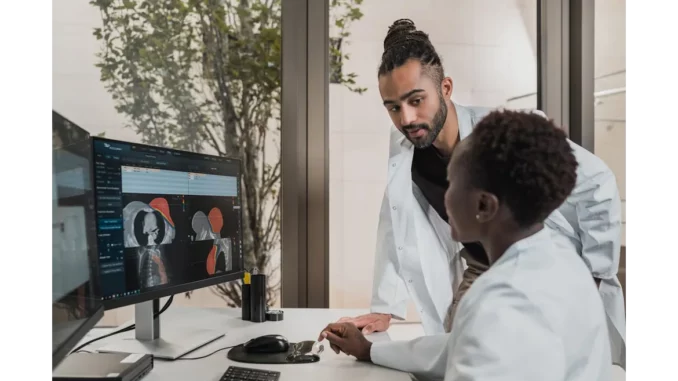
As we find ourselves on the brink of a technological renaissance, the healthcare industry stands poised to undergo significant transformation through the incorporation of automation. The convergence of advanced technologies—such as artificial intelligence (AI), robotics, and machine learning—is reshaping the medical landscape, offering unprecedented opportunities to streamline processes, enhance patient outcomes, and broaden access to healthcare. However, central to this evolution is the empowerment of healthcare professionals, ensuring that human expertise remains indispensable in patient care. This exploration delves into the multifaceted impact of automation, from patient care to administrative efficiency, highlighting the transformative potential of these technologies in medicine.
The integration of automation in healthcare represents a pivotal shift in how tasks traditionally performed by humans are executed. From routine administrative duties to complex diagnostic and therapeutic procedures, automation enhances rather than replaces the capabilities of healthcare professionals. By doing so, it enables more efficient delivery of superior patient care. One of the most profound impacts of automation lies in the enhancement of patient diagnosis and treatment. AI-driven systems in medical imaging and diagnostics now possess the capability to analyse medical images with remarkable precision, detecting early signs of diseases such as cancer, cardiovascular issues, and neurological disorders. This capacity for early diagnosis facilitates timely intervention, ultimately leading to improved patient outcomes.
Moreover, automation is instrumental in advancing personalised medicine. AI algorithms, by evaluating a patient’s medical history, genetic information, and lifestyle factors, can propose tailored treatment plans. This approach ensures that patients receive the most effective treatments while minimising the risk of adverse reactions. On the administrative front, healthcare systems often find themselves encumbered by paperwork and repetitive tasks. Automation is revolutionising this domain by streamlining processes like billing, scheduling, and management of patient records. Robotic Process Automation (RPA) software can execute these tasks with speed and precision, significantly reducing errors and freeing healthcare professionals to focus more intently on patient care. The management of patient data has also benefitted immensely from automation, with electronic health records (EHRs) enabling quicker and more accurate data access, thereby reducing delays in treatment decisions.
The realm of patient monitoring and follow-up care has been dramatically transformed by automation as well. Remote patient monitoring has become a reality, thanks to wearable devices that continuously collect vital sign data, such as heart rate, blood pressure, and oxygen levels. AI analyses this data to alert healthcare providers to potential health issues, allowing for prompt intervention. Automation also aids patients in managing their health outside clinical settings. Automated reminders for medications, appointments, and follow-up visits help ensure that patients remain engaged with their treatment plans, leading to better health outcomes and reduced hospital readmissions.
One of the perennial challenges in healthcare is the reduction of medical errors, a domain where automation can make substantial contributions. Automated systems for medication dispensing and Computerised Physician Order Entry (CPOE) ensure patients receive the correct medication in appropriate dosages, thereby reducing the likelihood of adverse drug reactions. In surgical settings, robotic systems afford enhanced precision, allowing surgeons to perform intricate procedures with greater accuracy. While robots assist in these procedures, the expertise of human surgeons remains paramount, ensuring a balanced partnership between technology and human skill that enhances patient safety and surgical outcomes.
In light of the global shortage of healthcare workers, automation presents a valuable solution. By taking over routine tasks, healthcare professionals can devote more time to direct patient care, thereby enhancing service quality without increasing burnout. Importantly, automation aims to support healthcare staff, preserving the human touch that is vital to patient trust and comfort. Despite the manifold benefits, automation in healthcare also presents challenges and ethical considerations. Ensuring patient privacy and data security is paramount in an increasingly digital world. Healthcare institutions must invest in robust cybersecurity measures to protect sensitive patient information, adhering to regulations such as the General Data Protection Regulation (GDPR). Moreover, the ethical use of AI in decision-making necessitates that AI remains a supportive tool rather than an autonomous decision-maker, with healthcare professionals retaining final judgement.
As we gaze towards the future of medicine, it becomes evident that a balanced partnership between automation and healthcare professionals will be pivotal. Automation is poised to further streamline operations, enhance accuracy, and improve patient outcomes. However, this transformation is not about displacing human roles but about empowering them. Healthcare remains a profoundly human-centric field, where compassion, empathy, and personal interaction are irreplaceable. As technology continues to advance, the ultimate goal is to enable healthcare professionals to excel in their core mission: caring for their patients. By alleviating administrative burdens and augmenting diagnostic and treatment capabilities, automation is paving the way for a healthcare system that is not only efficient but also deeply human-centred. It is within this harmonious integration of technology and humanity that the future of healthcare resides.


Be the first to comment